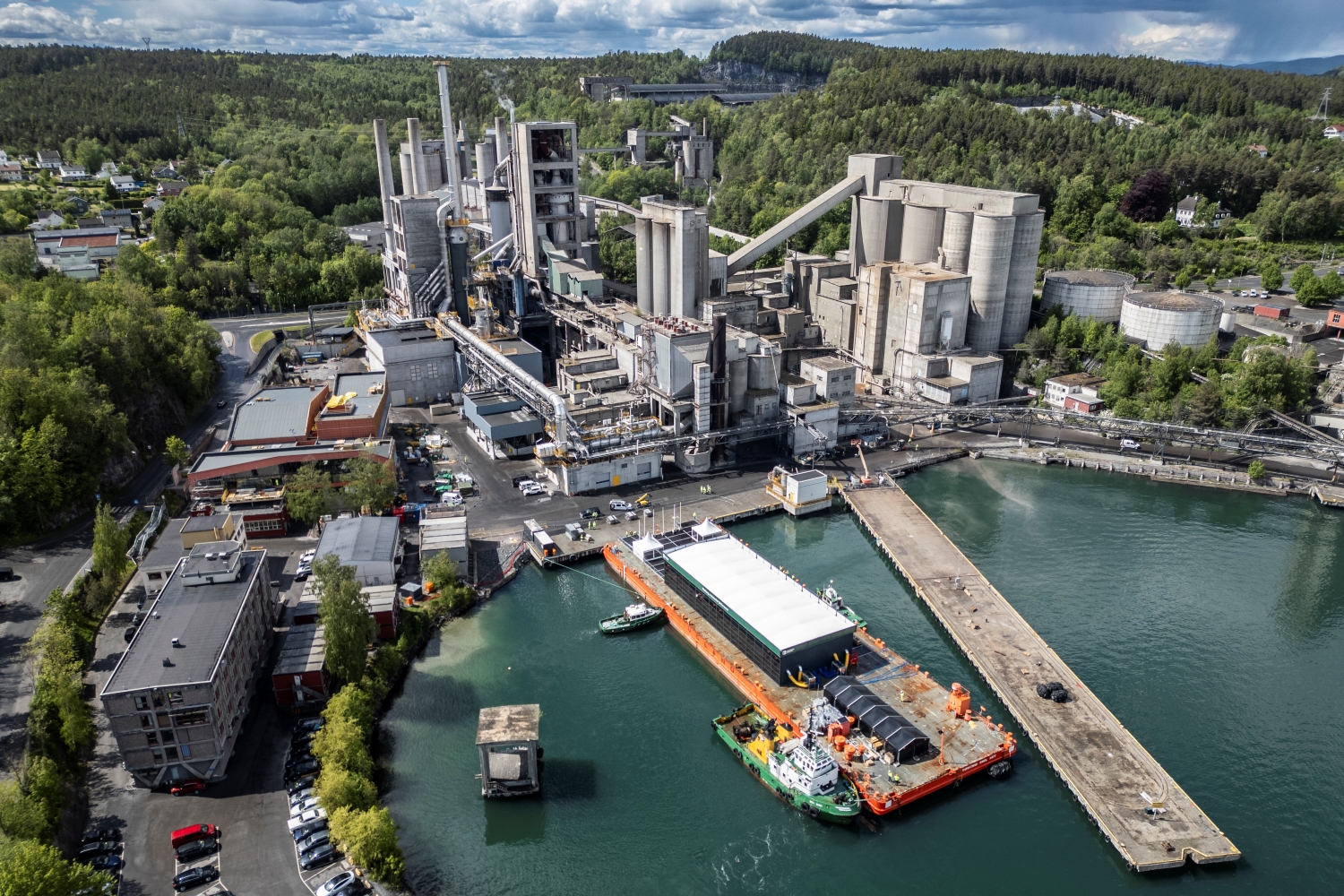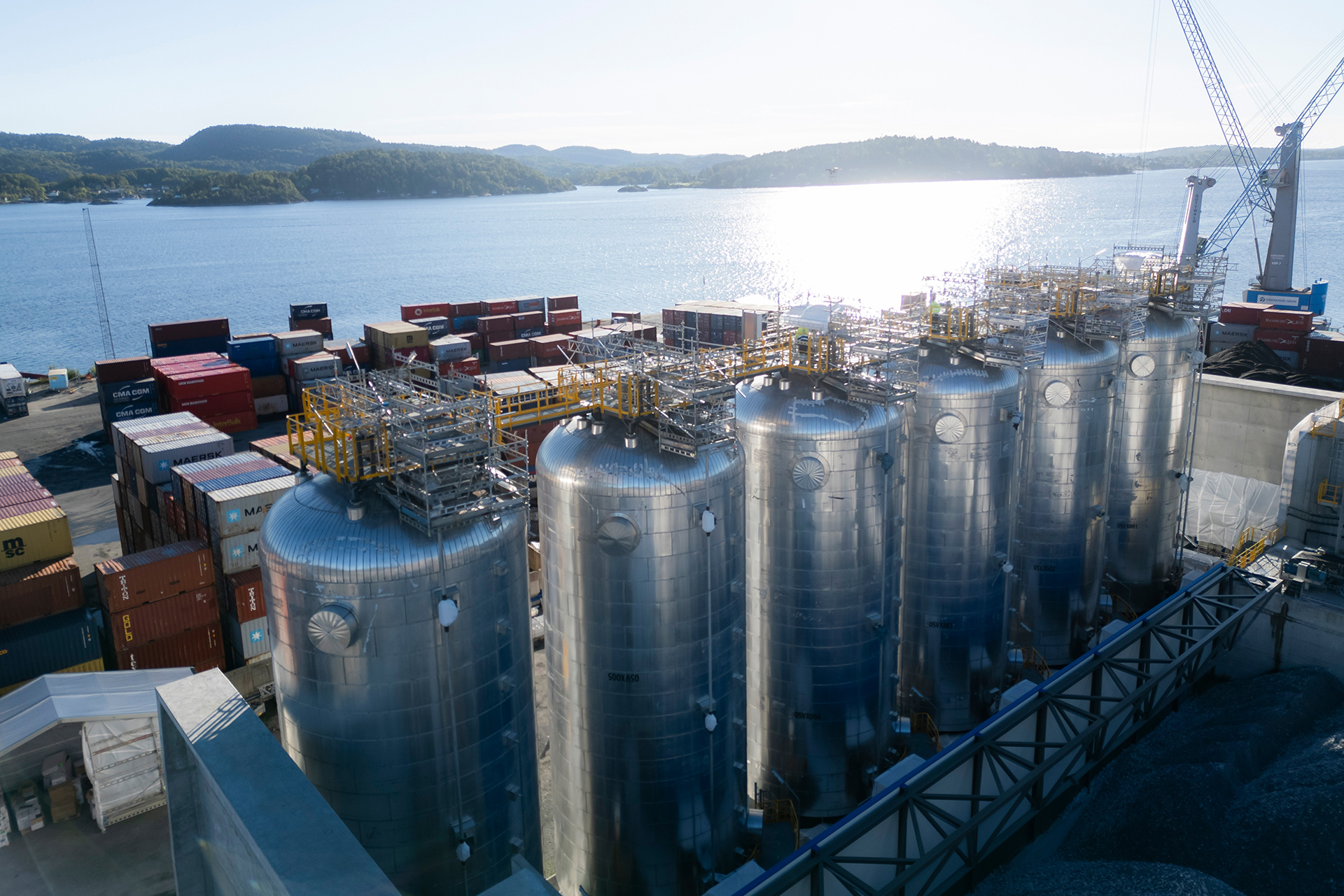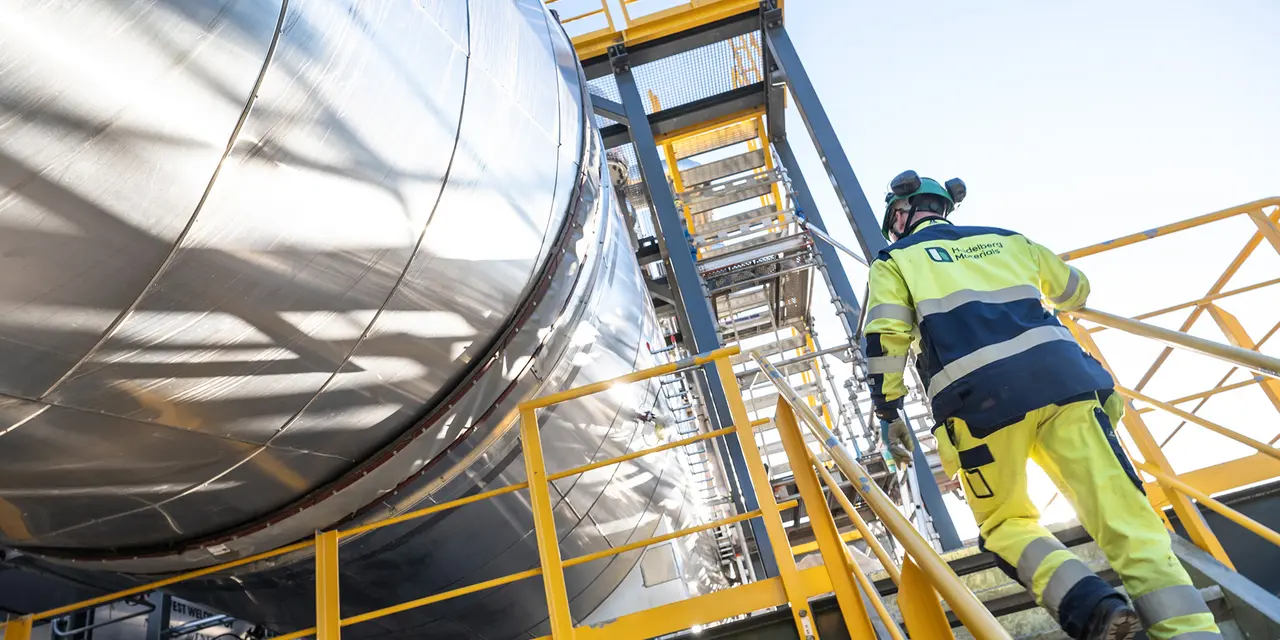Overview
Heidelberg Materials have implemented a Carbon Capture and Storage (CCS) project at its Brevik plant, Norway. This technology captures approximately 48% of the carbon dioxide (CO₂) emissions generated during the calcination process and fuel combustion in kiln operations. Instead of being released into the atmosphere, the captured CO₂ is permanently stored underground. Once permanently stored, CO₂ reductions can be attributed to Heidelberg Materials’ cement products.
Heidelberg Materials uses Environmental Attribute Certificates (EACs) to track and allocate the CCS benefits to cement products. The generation of EACs is tied to the production of clinker under carbon capture conditions at Brevik. Each tonne of clinker produced under CCS conditions carries an emission reduction of 307.3 kg CO₂eq./t clinker compared to non-CCS operations. Therefore, each EAC carries a reduction of 307.3 kg CO₂ eq./t clinker.
Carbon accounting and evoZero declaration

Heidelberg Materials has taken thorough measures to establish the credibility of EACs and hence CO₂ reductions generated by our CCS project. To prevent any risk of double counting, we have implemented a secure virtual Carbon Accounting Tool (referred to as Carbon Bank) on a public distributed ledger.
Each deposit to the Carbon Bank occurs only upon 1) verified production of 1 tonne of clinker under carbon capture conditions and 2) the permanent geological storage of CO₂ and assurance by a third-party verifier. When a delivery of evoZero or evoBuild cement is made, we calculate the corresponding EACs and the equivalent CO₂ reductions to be deducted from the Carbon Bank based on the ordered product type and volume. This value is then withdrawn from the Carbon Bank and allocated to the customer's cement delivery via:
- Prospective EPD
and/or, depending on the chosen product (see below): - An evoZero product declaration: This declaration is intended to support the holder in reporting a reduction in their Scope 3 sustainability reporting
Third party assurance
Heidelberg Materials AG has engaged with DNV Business Assurance Germany GmbH to provide limited assurance on Carbon Bank deposits, withdrawals, and on the allocation of emission reductions to cement products. Audits are conducted against the criteria listed in Heidelberg Materials’ evoZero methodology ⭳, with the results of DNV's work expressed in an assurance statement.
Upon the closure of a predefined period, the third-party assurance body examines clinker production, carbon capture data and the quantity of verified permanently stored CO₂. A second verification step ensures EACs allocated to sales transactions have not exceeded the equivalent volume of permanently stored CO₂ that is available for allocation in the Carbon Bank. This additional assurance process certifies that no instances of double counting or over selling have taken place, providing confirmation of the integrity and authenticity of the Carbon Bank.
Physical products variants from Brevik (e.g. CEM II/B-M (V-L) 42,5 R)
Grey cement - Standardsement FA, Brevik – CEM II/B-M (V-L) 42,5 R: This is the conventional physical product from the Brevik facility with a Global Warming Potential (GWP) calculated without taking CCS into consideration. The GWP-total (net) is 451 kg CO₂eq./t of cement. As documentation of the GWP, the cement is delivered with a published EPD .
evoBuild Carbon Captured – evoBuild Low carbon Standard cement FA, CEM II/B-M (V-L) 42.5 R: The physical evoBuild Carbon Captured product incorporates the CO₂ reductions achieved through carbon capture at the Brevik facility, proportionally attributed across the entire cement production process. For this cement, the GWP-total (net) is 230 kg CO₂eq per tonne of cement, reflecting a CCS-related reduction of 221 kg CO₂ per tonne compared to the standard product. To document the GWP, customers receive a published Prospective Environmental Product Declaration (P-EPD) .
evoZero Carbon Captured Brevik: This is the physical product where CO₂ reductions are attributed to dedicated parts of the cement volume using environmental attribute certificates (EACs) generated by means of applying single site mass balancing with free attribution for the output from Brevik cement plant. The GWP-total (net) for the main product (CEM II/B-M (V-L) 42.5 R) is 46 kg CO₂eq per tonne of cement, a CCS-related reduction of 405 kg CO₂eq per tonne of cement or 90% compared to the conventional product. To document the GWP, customers receive a published Prospective EPD of the underlying physical cement (here: evoBuild Low carbon Standard cement FA, CEM II/B-M (V-L) 42.5 R) and an evoZero Product Declaration reflecting the mass balance portion.
It is important to disclose that there will be no physical segregation between those three product variants and that customers may purchase cement which was produced when CCS was operational, but they may choose not to purchase an evo product variant or vice versa. The allocation of CCS-based CO₂ reductions via EACs to products will be based on chain of custody models which are introduced in chapter 3 of the underlying evoZero methodology ⭳.
Non-physical product
evoZero Carbon Captured: In countries not local to the Brevik plant but either covered by EU ETS, or UK or Switzerland, we will offer customers the choice of a non-physical product to avoid transport emissions that would be incurred by shipping the physical product from Brevik.
When a customer sources cement from a Heidelberg Materials AG plant local to them, verified EACs generated at Brevik and stored in the Carbon Bank are transferred and bundled to the locally sourced cement via EACs generated by CCS clinker production at Brevik. The GWP of the delivered, non-Brevik product, will be reduced to zero using the necessary amount of EACs. A block chain solution supports traceability back to the Brevik plant. The evoZero product claim is tied to a physical CCS-based carbon reduction at Brevik and hence, customers that buy non-physical evoZero Carbon Captured are investing in the production of CCS clinker at the Brevik site.
As documentation of the GWP, non-physical evoZero Carbon Captured is delivered with an evoZero Product Declaration together with the published EPD of the underlying physical cement.
Here is an overview of the above introduced product variants of Standard FA CEM II/B-M (V-L) 42.5 R manufactured at Brevik. Other cement types produced at Brevik will carry different GWP values.

| Physical products from Brevik CEM II/B-M (V-L) 42.5 R | Non-physical product | |||
|---|---|---|---|---|
| Product variants | Grey cement Brevik | evoBuild CC Brevik | evoZero CC Brevik | evoZero CC |
| GWP, net1) [kg CO₂ eq./t] | 451 | 230 | 46 | 0 |
| Documentation of GWP | EPD | prospective EPD (P-EPD) | P-EPD + evoZero declaration | EPD + evoZero declaration |
| CCS contribution [kg CO₂/t] | 0 | –221 | –405 | GWP of local grey cement |
